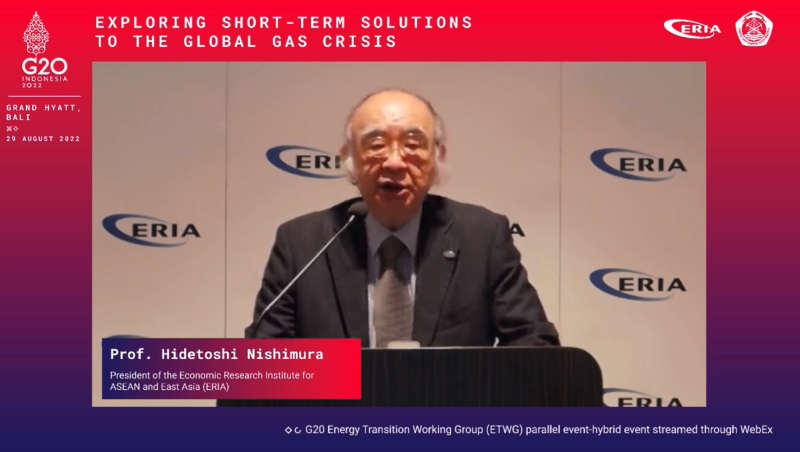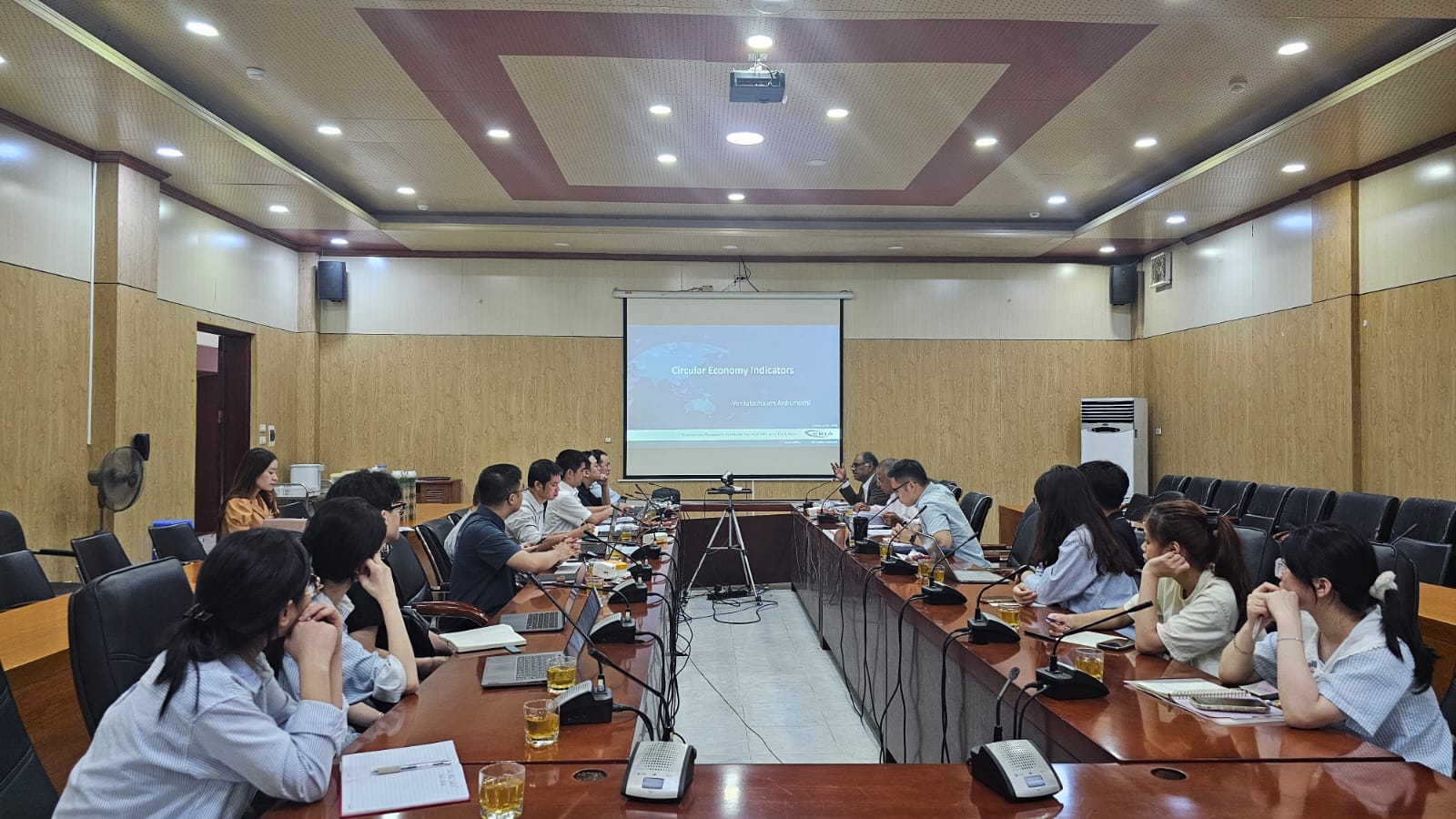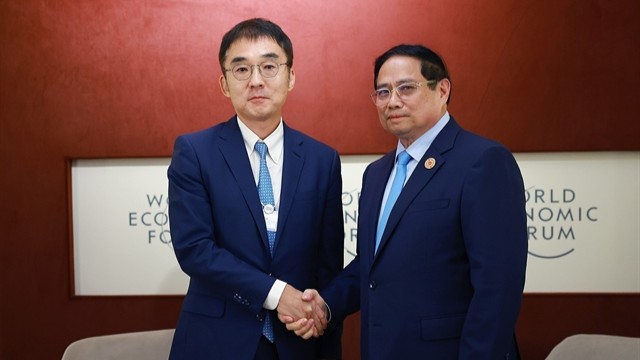'Exploring Short-term Solutions to the Global Gas Crisis' - G20 Energy Transition Working Group (ETWG) parallel event
Date:
29 August 2022Category:
News, Press ReleasesShare Article:
Print Article:
Bali, 29 August 2022: The Economic Research Institute of ASEAN and East Asia (ERIA) and the Ministry of Energy and Mineral Resources (MEMR) co-hosted the Hybrid Workshop as a G20 ETWG III Parallel Event on 'Exploring Short-term Solutions to the Global Gas Crisis' organised back-to-back with the 3rd Energy Transition Working Group Meeting and the G20 Energy Transition Ministerial Meeting.
The world is going through a complex energy crisis, and natural gas is just a single dimension. Energy trade is now on a global level and is more interrelated and intertwined than ever before. Therefore, the consequences of the energy crisis are being felt across countries and industries in more acute ways. First, natural gas markets were already tight before the outbreak of the Russian–Ukrainian conflict on 24 February 2022 due to underinvestment since 2015, the coronavirus disease (COVID-19) in 2020, the rapid albeit uneven post-COVID-19 recovery, and disrupted supply chains, primarily commodity supply chains. As a result, the supply of energy could not catch up with robust resilient demand recovery. There is an ongoing mismatch of supply and continuous, more responsive, and elastic energy demand. Second, the situation was exacerbated afterwards by further elevated energy price levels and volatility. The current gas crisis could seriously affect not only the world energy security but also the world energy transition progress. The workshop was held with the aim of finding short-term solutions to stabilise the global gas market so that the world can continue to recover together and strongly amidst the geopolitical crisis.
The workshop started with opening remarks by Mr Yudo Priaadi, The Chair of G20 ETWG. The first keynote was delivered by Prof Tutuka Ariadji, Director General, Directorate General of Oil and Gas, Ministry of Energy and Mineral Resources of Indonesia, who explained about Indonesia gas policy and development in the midst of global gas crisis. The second keynote speech was delivered by H.E. Eng. Mohamed Hamel Secretary General of the Gas Exporting Countries Forum (GECF) who emphasized the importance of natural gas in fuelling economic growth, boosting social advancement, and contributing to environmental protection. This was followed by the third keynote speech by Prof Hidetoshi Nishimura, President of ERIA. He stressed that in order to address the current global gas issue as swiftly as possible, ERIA would like to invite the key stakeholders to work together and share their best practices, experiences, and commitments.
Mr Hiroshi Hashimoto, the Head of Gas Group, Fossil Energies & International Cooperation Unit, The Institute of Energy Economies Japan (IEEJ), as the main speaker in this event, explained seven proposed short-term solutions for the current gas crisis. Panel Session One, moderated by Mr Nanang Untung, Expert Staff from MEMR, discussed the importing and exporting countries’ perspectives and reactions on the proposed solutions on global gas crisis. Session Two, moderated by ERIA’s Senior Policy Fellow for Energy and Environment, Prof Jun Arima, discussed the market effects of possible short-term solutions.
After the two panel sessions, the following list of short-term solutions for ameliorating gas crisis can be enumerated:
- First, ramp up of natural gas and LNG production. Consideration should be given to the fact that the existing LNG facilities are currently at full capacity and new LNG investment will need around five years from the final investment decision to production.
- Second, support countries with idle capacities or delayed upstream and midstream gas projects to regain their capacity to produce and export gas, especially to the most-needed regions. Regional cooperation might be among the key factors to help certain countries to get rid of their potential capacity constraints which might be due to various issues such as financial problem and domestic security instability.
- Third, develop an emergency plan initiated by the G20 group to ‘reroute’ LNG cargoes to the world’s regions with high need but low purchasing power. It is crucial to help low-income countries to procure LNG cargoes. Rerouting LNG cargos to needful regions with low purchasing power will help. On the other hand, given gas trade is privately driven, compensation mechanism or financial incentives would be necessary for either gas companies or importing countries.
- Fourth, optimize LNG cargo destinations by taking advantage of specific contractual agreements. Together with the rerouting of the LNG cargoes from the oversupplied region, increasing the number of available LNG cargoes is a crucial effort in the near term. Exporting countries must be the ones who take the initiative to optimize the operation of their LNG vessels and terminals/ports.
- Fifth, issue statements that can help stabilize the short-term gas market. This kind of message assuring the necessity of new gas investment is crucial, as we need a policy and business environment enabling new natural gas investment. Negating all fossil fuel investment including natural gas for the sake of climate mitigation could prolong the current energy crisis and result in eroding sound economic growth, which is indispensable for long-term mitigation endeavors.
- Sixth, initiate and intensify discussions on formulating potential short-term measures to mitigate excessive volatility in prices. We need to avoid making interventions that might create more market uncertainty and to response correctly and cooperatively to price market signals. Competition authorities could play a role in domestic markets in mitigating excessive volatility of prices. Cross-country collaboration among competition authorities could be more challenging since it will be extremely difficult to share a common view among stakeholders with different interests.
- Seventh, urgently establish a universally accessible, real-time information platform on natural gas trade. Private companies’ willingness to disclose various information is a key factor on establishing this platform. Joint Gas Data Initiative offers a good basis for such endeavors.
Throughout the two panel sessions, given G20’s strong influence in terms of gas supply and demand, many panellists emphasized that the G20 needs to send strong and unequivocal messages about the necessity of new gas investment. Such messages could positively change behaviours of the financial institutions vis-à-vis gas related investment. Since the gas crisis could be prolonged, G20 is also encouraged to continue their discussion and collaboration with a view to establishing enabling policies and business environments which are indispensable for robust gas investment.
After the two panel sessions, Mr Koji Hachiyama, COO of ERIA, closed the event, emphasizing the importance of energy security in allowing all countries to continue with the economic recovery from the pandemic and to continue with an energy transition plan to progress towards net zero emissions by the mid of the century.
Mr. Hachiyama suggested that G20, with strong influence on both gas supply and demand, should consider all the available means for ameliorating the situation in collaboration with relevant international organizations such as IEA, IEF and GECF.
ERIA shall provide continuous support in solving the gas crisis, in ensuring energy security, and in accelerating the energy transition process.

.jpeg)
.jpeg)







